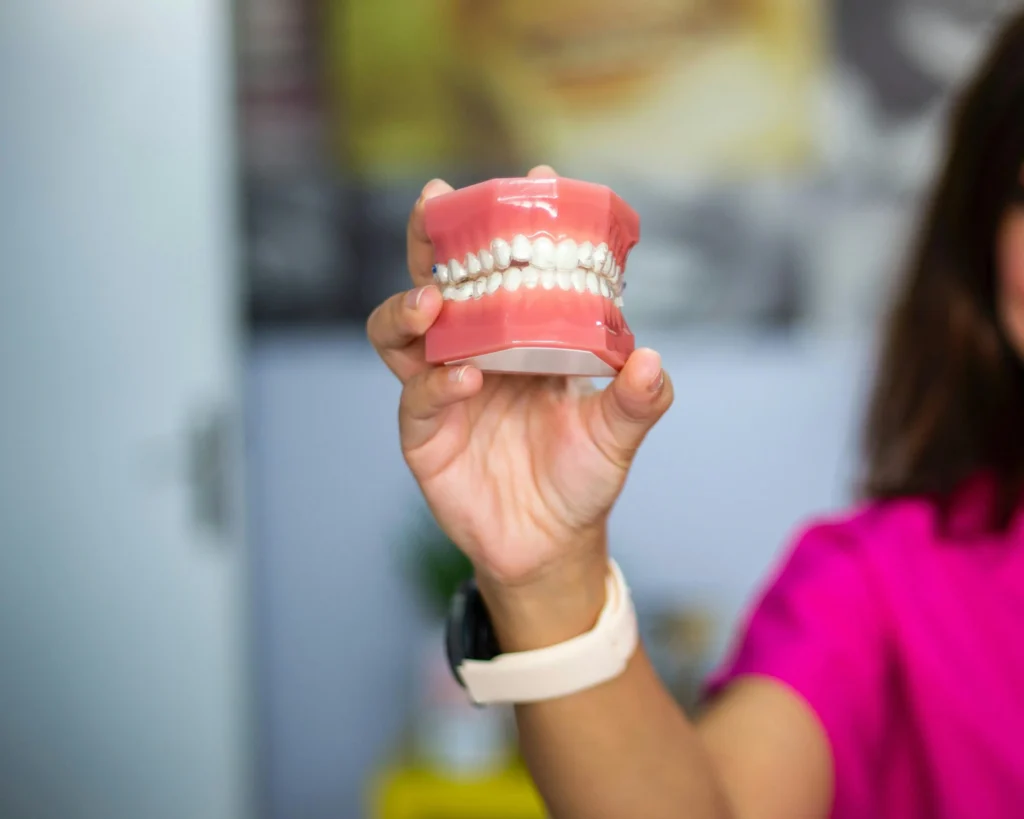How Dental Implants Improve Oral Health?

Dental implants are a new approach in implant dentistry to address the issue of missing teeth. Dental implant placement stimulates bone formation and bonding with organic surrounding bone and mass which supports the prosthetic teeth. Compared to traditional dentures, dental implants are more effective and feel like natural teeth because they are fixed to the implant body, just like real teeth. Types of dental implants In implant dentistry, there are many different options for replacing the missing teeth with dental implants as follows. Single Tooth Restorations: These single-piece units replace one missing tooth without attaching to other teeth or implants. Dental implant therapy involves surgery where an oral surgeon inserts the implant into the jawbone. After the implant bonds to the bone, a crown or artificial tooth is placed on the implant to restore appearance and functionality. Implant-Supported Bridges (or Fixed Dentures): This type of dental implant involves the placement of a set of teeth that is fixed on dental implants to ensure that the user cannot remove it. This dental implant procedure is ideal for filling the gaps of several missing teeth in a line. The implant-supported bridge recreates the chewing efficiency of natural dentition and helps prevent the overload of implants that may cause implant failure. Removable Implant-Supported Dentures (also known as Implant-Supported Overdentures): This option involves a prosthesis that can be taken out and is used when several teeth are missing. During the dental implant surgery, the surgeon installs the implants into the jawbone and these serve as support for adjacent teeth and the overdenture. It is removable for cleaning but the implants hold the denture in place thus improving the comfort and functionality of the fixed denture. Benefits of Dental Implants Dental implants have numerous advantages that set them high among the other teeth replacement options and methods. Natural look and comfortable fit, similar to natural teeth Dental implants are created to be aesthetically appealing, comfortable, and functional. It appears natural and has a comfortable fit, which is such a good value for the long term and is a great investment in oral health. Long-lasting and reliable, with a high success rate With proper care, dental implants are durable and stable, often lasting longer than standard dentures or other replacement methods. Studies show that well-planned and maintained dental implants have excellent survival rates compared to similar options. Dental Implant Surgery Main surgical procedures for dental implant surgery Dental implantation typically occurs in several phases and requires significant healing time between them. From surgery to final prosthesis installation, the process can take three to eight months to ensure proper bone healing and integration. Additional procedures to augment deficient bone in the implant site At times, complementary operations are required to provide sufficient bone in the area of the implant to guarantee a reliable anchor point for the dental implant. One of the most frequently used and efficient methods of stimulation is bone grafting. Bone grafting is required if the jawbone is too soft, or its thickness is insufficient to accommodate the implant since it is necessary for implants to have sufficient bone support. Candidacy and Suitability Who is a candidate for dental implants? Dental implants are recommended for individuals with a poor smile due to missing teeth or damaged teeth. In most cases, anyone who has one tooth root or several missing teeth can opt for dental implants provided one is medically fit to undergo a procedure such as tooth extraction or root canal treatment. What if I have missing teeth or bone loss? If a dentist tells you that you cannot receive dental implants because of bone loss, it is recommended to consult with another dentist. Modern dental care technologies and regenerative surgeries, including dental bone grafts and sinus lifts, generally can manage the loss of bone tissue and enable dental implants. Dental bone grafts entail the use of bone grafts in the implant site to enhance the strength of the implant while sinus lifts involve the placement of new bone specifically in the molar and premolar regions of the upper jaw. These procedures can improve bone density to a great extent, preserve bone, and make it easier to place dental implants where the teeth are missing. Consequently, the fact that you have bone loss does not necessarily disqualify you from receiving dental implants or the advantages that come with them. Are dental implants painful? Dental implant placement involves surgery that entails some pain and swelling; however, you can control these symptoms with adequate care and medications. During the procedure, the dentist installs an implant in the area to replace missing teeth with replacement teeth or dentures. After surgery, the patient usually feels pain and swelling, but simple pain relievers such as NSAIDs, including Ibuprofen, can easily relieve these symptoms. In order not to aggravate the situation, there is the advisability of refraining from rigorous activities such as doing exercises and visiting the gym for a few days. Proper oral care should be maintained to avoid additional problems that may set in during the recovery period. Are dental implants safe, and what are the potential risks and complications? A proficient and experienced surgeon can perform dental implant surgery safely. However, as with any surgery, certain risks and side effects are involved. The formation of the osteotomy or placement of the implant may cause sensory impairment, affecting nerves such as the inferior alveolar nerve, maxillary sinus, and blood vessels in the region. It may cause problems like numbness of the limbs, problems with the sinuses, or excessive bleeding. Further, having poor oral hygiene habits weakens the immune system putting the patient at a high risk of getting infected at the implant location which may lead to implant failure. Nevertheless, the success rate of such surgeries is high, especially when it comes to specially trained dentists, who would not only plan the implantation carefully but also would closely watch the progress of his/her patient. Post-Operative Care and Recovery Do dental implants require special care and maintenance after
Top 5 Reasons You Should Visit Your Dentist Routinely

Regular dental visits are crucial for maintaining optimal oral health and overall well-being. Despite the common tendency to postpone or avoid dental appointments, there are compelling reasons to prioritize routine check-ups. Here are the top five reasons why you should make visiting your dentist a regular habit. 1. Prevent Cavities and Tooth Decay One of the most significant benefits of regular dental visits is the prevention of cavities and tooth decay. Even with diligent brushing and flossing, plaque and tartar can build up in hard-to-reach areas. During a professional cleaning, your dentist can remove this buildup, preventing cavities and maintaining the health of your teeth. Benefits: 2. Detect and Treat Gum Disease Early Gum disease, also known as periodontal disease, can progress silently without noticeable symptoms until it becomes severe. Regular dental check-ups allow your dentist to detect early signs of gum disease, such as inflammation and bleeding, and provide appropriate treatment. Benefits: 3. Oral Cancer Screening Oral cancer is a serious and potentially life-threatening condition that can be effectively treated if detected early. During your routine dental visits, your dentist will conduct a thorough examination of your mouth, including your tongue, throat, and gums, to identify any signs of oral cancer. Benefits: 4. Maintain a Bright and Healthy Smile Regular visits to the dentist help keep your smile bright and healthy. Professional cleanings remove stains and tartar that can cause discoloration, giving you a radiant smile. Additionally, your dentist can provide personalized advice on maintaining good oral hygiene at home. Benefits: 5. Save Money on Future Dental Costs Routine dental visits can save you money in the long run by preventing serious dental issues that require extensive and costly treatments. By addressing minor problems early, you can avoid the need for more complex procedures such as root canals, extractions, and dental implants. Benefits: Choosing Ideal Smiles of Stamford to be Your Trusted Dentist Choosing Ideal Smiles of Stamford as your trusted dentist means placing your oral health in the hands of a dedicated and experienced team committed to providing top-quality dental care. Our practice prioritizes your comfort and well-being, offering a comprehensive range of services from preventive care to advanced treatments. With state-of-the-art technology and personalized care plans, we ensure that every visit is effective and pleasant. At Ideal Smiles of Stamford, we believe in building long-term relationships with our patients, guiding you on your journey to optimal oral health and a radiant smile. Schedule an appointment with Ideal Smiles and trust us to be your partner in maintaining a healthy and beautiful smile for years to come.
Root Canal Therapy: Signs You Need One and Consequences For Not Getting One

What is a Root Canal? A root canal removes infected or damaged pulp from inside a tooth. The pulp, containing nerves, blood vessels, and connective tissue, can become infected due to decay, cracks, or trauma, causing severe pain and complications if untreated. During the procedure, the dentist removes the infected pulp, cleans and disinfects the inside of the tooth, and then fills and seals it to prevent future infection. Signs You Need a Root Canal Recognizing the signs that you might need a root canal can help you seek timely treatment and avoid complications. Here are some common symptoms: • Severe tooth pain, especially when chewing or applying pressure • Prolonged sensitivity to hot or cold temperatures • Discoloration or darkening of the tooth • Swelling and tenderness in the nearby gums • A persistent pimple on the gums • Pain that wakes you up at night What are the Consequences of Delaying a Root Canal? Delaying a root canal can have serious repercussions on your dental and overall health. Here’s what can happen if you put off treatment: • Increased Pain: The infection can spread, causing more severe pain. • Abscess Formation: An untreated infection can lead to an abscess, a pus-filled pocket that can cause significant pain and swelling. • Tooth Loss: The infection can damage the tooth so severely that it may need to be extracted. • Spread of Infection: The infection can spread to other parts of your body, potentially leading to serious health issues such as heart disease or stroke. What Happens During the Root Canal Treatment? Root canal therapy typically involves the following steps: Aftercare Tips Proper aftercare is crucial for the success of your treatment. Here are some tips to help you recover: • Avoid chewing on the treated tooth until it is fully restored with a crown. • Maintain good oral hygiene by brushing and flossing regularly. • Take prescribed medications as directed by your dentist. • Schedule follow-up appointments to monitor the healing process. • Avoid hard and sticky foods that could damage the treated tooth. How Long Does Root Canal Last? A root canal can provide long-lasting results with proper care. Its success depends on factors like the severity of the infection, the quality of the restoration, and your oral hygiene habits. Regular dental check-ups and good oral care are essential to maintain the benefits of your treatment. Bottom Line Root canal therapy is a vital procedure that can save your tooth and relieve pain caused by infection. Recognizing the signs that you need this procedure and seeking timely treatment can prevent serious complications. Delaying treatment can lead to increased pain, abscess formation, tooth loss, and the spread of infection. With proper aftercare and regular dental visits, a root canal can provide long-term relief and restore your oral health. If you suspect you need one, don’t delay—contact Ideal Smiles of Stamford, CT, or request an appointment and safeguard your dental health.
Dental Veneers: Everything You Need To Know About Them

Welcome to our deep dive into the world of dental veneers, a popular cosmetic dentistry solution that has transformed millions of smiles worldwide. Whether you’re considering veneers for aesthetic reasons or to address dental issues, this guide will walk you through everything you need to know, from their fundamental concept to the detailed procedure, including types, comparisons with crowns, risks, benefits, and costs. What Are Veneers? Dental veneers are thin, custom-made shells designed to cover the front surface of teeth to improve their appearance. These shells are bonded to the teeth, changing their color, shape, size, or length. Veneers can be made from porcelain or from resin composite materials. How Veneers Work Veneers work by covering the visible part of the tooth, much like a mask or a cover. They are carefully crafted to fit the tooth and blend in with the surrounding teeth, creating a natural-looking smile. The process usually requires a few visits to the dentist—one for consultation, another to prepare the teeth, and a final visit to apply the veneers. Who Needs Them? Veneers are suitable for individuals looking to correct various dental issues, such as: Different Types of Veneers There are primarily two types of veneers: porcelain and composite resin. Veneers vs. Crowns While veneers cover only the front surface of a tooth, crowns encase the entire tooth. Dentists use crowns on teeth that need additional structural support or are severely damaged. Conversely, they primarily use veneers for cosmetic improvements, which necessitate less tooth surface removal before application. The Procedure Getting veneers typically involves the following steps: Risks and Benefits Risks Benefits Cost The cost of veneers depends on the type, the number of teeth treated, and the geographical location. Porcelain veneers are generally more expensive than composite resin veneers. While they can be a significant investment, many find the transformative results and boost in self-confidence to be worth the cost. In conclusion, dental veneers present a flexible and potent method for enhancing your smile. If you’re aiming to improve the color, shape, or alignment of your teeth, veneers offer a tailored approach. For a detailed discussion on how veneers can meet your specific dental goals, reach out to Dr. Natalia Silva at (203)-359-2222 or schedule an appointment. Consulting with a qualified dentist like Dr. Silva will help you ascertain whether veneers are the ideal option for your dental needs.
Everything You Need To Know About Dentures: Cost, Benefits, and Procedures.

Dentures are classified as removable dental prosthetic appliances used to replace missing teeth dental bridges and the associated structures. These appliances can be made to be fixed in the upper arch, the lower arch, or both by the requirements of the patient. Dentures are usually made of different materials like acrylic, resin, nylon, metal, and porcelain so that the dentures would be strong and aesthetically pleasing. To avoid slippage, patients who wear dentures often apply some form of sticky paste known as dental cement. The use of a denture brush and denture cleaner is recommended for daily cleaning to ensure oral hygiene and fresh breath. It is important to clean the dentures daily and also visit the dentist regularly from time to time for examinations as the mouth continues to change with time. Types of Dentures There are different types of dentures based on the requirements of an individual for the substitution of lost teeth and overall oral condition. Complete Dentures (Full Dentures): Full dentures are those that are employed to replace all the natural teeth in either the mandibular or maxillary arch. They are specially designed to closely embrace the abutments, and sit on the gums and the underlying alveolar bone. Complete dentures enable effective chewing and speaking and also improve aesthetics by maintaining the shape of the face due to the support given to the cheeks and lips. Partial Dentures: The partial dentures are used to replace a few missing teeth and are fixed on the remaining natural teeth. Sometimes, they employ a metallic base or clips that help in the attachment of the complete denture. These not only help to replace the missing teeth but also prevent the movement of the neighboring teeth. This type of denture is specifically suitable for individuals who still possess some healthy natural teeth. Immediate Dentures: Immediate dentures are made after the teeth have been extracted and it takes some time for the gums to heal before one can wear the permanent dentures. This makes it possible for the patients to do without the teeth during the time of healing. Implant-Supported Dentures: As opposed to conventional dentures, implant-supported dentures provide more support and feel more like natural teeth by attaching the denture to the implants. These are the metallic screws that are inserted into the jaw bones to act as anchors. Such types are especially useful for those patients who have had severe bone loss in the jaw, as implants stimulate bone growth and promote the preservation of bone tissue. Key Features and Benefits of Each Type: Benefits of Dentures Full or partial dentures provide many advantages, most importantly improving the patient’s quality of life in case of a serious condition. Here’s a detailed look at how they can improve various aspects of oral health and overall well-being: Restoring Appearance and Oral Functions: Complete and removable partial denture gives back one’s smile by replacing lost teeth and muscle attachment. They assist in color, giving a youthful appearance, and also function in bite as well as speech functions. Improving Chewing and Speaking Abilities: With real teeth removed, dentures help to chew well. They also help in the correction of acoustic phonetics thus enabling proper functioning of voice communication. Boosting Confidence and Self-Esteem: Prosthetic teeth help to restore the individuals’ smile, and they can interact with other people without any concern as their self-esteem will have improved. Preventing Further Tooth Loss and Gum Disease: For those with missing teeth, wearing dentures can ensure that there is no more deterioration of teeth or gum tissue since they provide cover to the gums to prevent them from coming in contact with food particles and bacteria that cause further deterioration. Maintenance involves a proper cleaning and a checkup with a dentist helps its durability and the health of the mouth. Denture Materials and Construction Dentures, also known as dental plates, are made from a range of materials that are selected depending on the case of an individual to offer the best kind of support and shape. Materials Used in Dentures: Currently, they can be made from the following materials: acrylic, resin, nylon metal, and porcelain. Acrylic and Resin: These materials are often incorporated into the construction of the denture base since they are light and can be easily modeled. They can look like real gumbo, and it is possible to have them come out in a natural color that is close to the gum color. Nylon: This material is quite elastic and imparted to some sort of partial dentures to be more comfortable when worn. Metal: Cobalt chromium with metal frameworks gives partial dentures stability and these are a strong and long-lasting material. Porcelain: Porcelain is preferred for denture teeth due to its resemblance to natural teeth and how they can be manipulated. It has a close resemblance in color and shape to normal dental tissues and it performs the characteristic functions of normal teeth. Construction of Dentures: The process of creating new dentures is not only the modeling and creation of the base but several other steps as well. Initial Assessment and Impressions: The dentist molds the gum tissue, along with the remaining teeth, to make an accurate impression that will serve the fabrication of the prosthetic. This is important to achieve the precise positioning and contours for the final denture. Denture Base Creation: The dentist prepares the body of the denture from acrylic or resin to rest on the gum and alveolar ridge. This base will support the artificial teeth. Designing Artificial Teeth: The design of the artificial teeth replaces missing teeth and mimics the appearance and function of natural teeth. We carefully align them to replicate the patient’s bite and facial structure, ensuring a natural aesthetic and efficient chewing. Assembling the Denture: After preparing the base for the full denture and the artificial teeth, the dentist positions them. For standard dentures, the dentist inserts the teeth directly into the acrylic or resin base material. For partial dentures, the dentist uses metal in the
Dental Implants In 2024: Everything You Need To Know

Dental implants stand as a breakthrough in restoring missing teeth, offering a long-lasting and visually appealing solution. This blog delves into the essentials, including what they are, when to consider them, their benefits, and potential risks, leveraging the latest insights from authoritative dental sources. What Are Dental Implants? Dental implants are titanium posts that surgeons place into the jawbone beneath the gum line, serving as a sturdy base for mounting replacement teeth or bridges. The American Academy of Implant Dentistry (AAID) highlights that implants mimic natural teeth in appearance, feel, and function, unlike removable dentures. When to Consider Dental Implants It is time to consider if you: Benefits of Dental Implants Implants offer significant advantages: Risks of Dental Implants Despite their high success rate, implants carry some risks: Choosing an experienced dental implant specialist and adhering to their advice minimizes these risks. Conclusion Dental implants offer a blend of functionality, comfort, and aesthetics for tooth loss. Assessing the benefits and risks is crucial. For expert guidance in Stamford, CT, contact Dr. Natalia Silva at Ideal Smiles at (203)-359-2222 or schedule an appointment to see if implants are right for you.
The Truth About Teeth Whitening: Risks and Side Effects

Teeth whitening has become a popular cosmetic procedure for enhancing one’s smile. With various options available, from at-home kits to professional treatments, understanding the process, its benefits, and potential risks is crucial. This blog post delves into the world of teeth whitening, offering insights into how it works, its advantages and drawbacks, and the differences between at-home and in-office procedures. What is Teeth Whitening? Teeth whitening is a cosmetic dental procedure aimed at lightening the color of stains. It’s designed to remove stains and discoloration, improving the overall appearance of teeth. The desire for a brighter smile has made it one of the most popular cosmetic dental treatments. How Does Teeth Whitening Work? The process involves the application of whitening agents, primarily hydrogen peroxide or carbamide peroxide. These chemicals break down stain deposits on the teeth, making the color less concentrated and your teeth appear brighter. The process can vary in duration and intensity, depending on the method chosen. Benefits and Risks of Teeth Whitening Benefits: Risks: At-Home vs. In-Office Whitening: Pros and Cons At-Home Whitening: In-Office Whitening: In conclusion, teeth whitening can be a safe and effective way to improve your smile, provided it’s done correctly and with an understanding of the benefits and risks involved. Whether you choose at-home or in-office whitening, it’s important to consult with a dental professional to ensure the best approach for your individual needs. If you have any more questions, do not hesitate to call Ideal Smiles in Stamford CT at (203) 359-2222 or request an appointment today!
